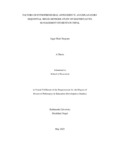
Please use this identifier to cite or link to this item:
https://hdl.handle.net/20.500.14301/493Full metadata record
| DC Field | Value | Language |
|---|---|---|
| dc.contributor.author | Neupane, Sagar Mani | - |
| dc.date.accessioned | 2025-05-14T05:06:51Z | - |
| dc.date.available | 2025-05-14T05:06:51Z | - |
| dc.date.issued | 202-05 | - |
| dc.identifier.citation | Neupane, S.M.(2025).Factors of entrepreneurial antecedents: An explanatory sequential mixed methods study of master's level management students in Nepal. | en_US |
| dc.identifier.uri | https://hdl.handle.net/20.500.14301/493 | - |
| dc.description.abstract | This study explored how entrepreneurial antecedents, including individual traits like passion and proactive personality, and external factors such as micro and macro institutions, influence entrepreneurial intentions and actions. It examined the interplay of personal traits and institutional factors on entrepreneurial pursuits, particularly in unique socioeconomic challenges that exist in Nepal. The study addressed the questions: a) What personality and institutional factors predict the entrepreneurial antecedents in graduating management students? b) To what extent does the measurement model of entrepreneurial antecedents explain entrepreneurial intentions? c) In what ways do the entrepreneurial antecedents outlined by the measurement model vary among graduating management students with diverse sociodemographic profiles? d) How do these personality and institutional factors exhibit variances when contrasting graduating students exhibiting the highest and lowest entrepreneurial antecedents? A sequential mixed methods approach was the methodological ground of the study, whereby the findings from both quantitative and qualitative methodologies are mixed and integrated. The study utilized a survey of 1096 randomly selected students in the first phase (quantitative phase), ten purposefully selected case studies in the second phase (qualitative phase) to explore a deeper understanding of the issue, and integrated the results (result mixing phase) to answer the research questions. The paradigm of the study was dialectical pluralism, acknowledging the convergence and divergence of entrepreneurial reality regarding entrepreneurial antecedents and intentions of graduating management students. Exploratory Factor Analysis of 38 survey items developed by using the Modified Delphi Method has revealed four key entrepreneurial antecedents with 52% of the overall variance: Support Mechanisms and Resilience (R2 = 55%), Competition Mindset (R2 = 58%), Unconventional Way of Thinking (R2 = 72%), and Fulfillment Orientation (R2 = 41%). The finding shows the significant influence of institutional factors and individual personality traits on entrepreneurship pursuit. Confirmatory Factor Analysis confirmed a strong fit for the measurement model (RMSEA = .057), supported by reliability and validity measures (Composite Reliability > .6, Average Variance Extracted (AVE)> .3, and Mean Shared Variance < AVE. The multiple regression analysis indicated that Fulfillment Mindset (β = .250) was the strongest predictor of entrepreneurial intention, followed by Unconventional Mindset (β = .168), Supportive Mechanism (β = .089), and Competitive Mindset (β = .085) with R2 of 18% inferred that the antecedents describe the intention significantly and fulfillment orientation was the primary descriptor. Moreover, entrepreneurial intention does not vary significantly in terms of sex, ethnicity, age, and institution type. However, a significant difference between the MBA (M = 4.86, SE = .06) and MBS (M = 4.68, SE = .04) showed that MBA students possessed significantly higher entrepreneurial intention because of their parental background from sound economic conditions. Similarly, perceived entrepreneurial antecedents did not vary considerably regarding sex and age groups but varied significantly among ethnic groups and institutional affiliations, showing the moderating effect of socioeconomic status in a few cases. The qualitative study findings further show that the vital role of institutional factors is to support creating an entrepreneurial environment. At the same time, personal traits like passion and proactive disposition are critical drivers of pursuits. However, structural embeddedness compels graduating students to prefer conventional jobs to entrepreneurial endeavors because of a bounded rationality caused by societal higher value for stable job paths. These traits enhance motivation, perseverance, and the ability to take opportunities. Both institutional and personality related antecedents directly correlate with entrepreneurial intention. The convergence of personality and environment leads to entrepreneurial action, which supports transforming static antecedents into dynamic behavior. The transformation is largely supported by strong entrepreneurial environments and a firm belief in competition shaped by the sociodemographics of an individual. Finally, the study deepens the theoretical understanding of entrepreneurial antecedents, along with the substantive, practical implications. The study revealed the interplay of the institutional factors and the influence of personal passion and proactive disposition, which shape one's entrepreneurial intentions. The major theoretical implication is to establish action theory, which integrates the institutional theory with personal traits; the convergence theory offers a framework for future endeavors to understand entrepreneurial antecedents. The study also suggests managerial implications, such as the potential for incorporating short-term vocational courses in university curricula to boost entrepreneurial intention in socioeconomic contexts like Nepal. | en_US |
| dc.language.iso | en | en_US |
| dc.publisher | Kathmandu University School of Education | en_US |
| dc.title | Factors of Entrepreneurial Antecedents: An Explanatory Sequential Mixed Methods Study of Master's Level Management Students in Nepal | en_US |
| dc.type | Dissertation | en_US |
| local.school.name | SOED | en_US |
| local.school.department | Department of Development Studies | en_US |
| local.school.program | PhD in Development Education | en_US |
| local.school.level | Ph.D. | en_US |
| Appears in Collections: | Theses | |
Files in This Item:
| File | Description | Size | Format | |
|---|---|---|---|---|
| Sagar Mani Neupane PhD Thesis hard_bind.pdf | 3.74 MB | Adobe PDF |  View/Open |
Items in DSpace are protected by copyright, with all rights reserved, unless otherwise indicated.